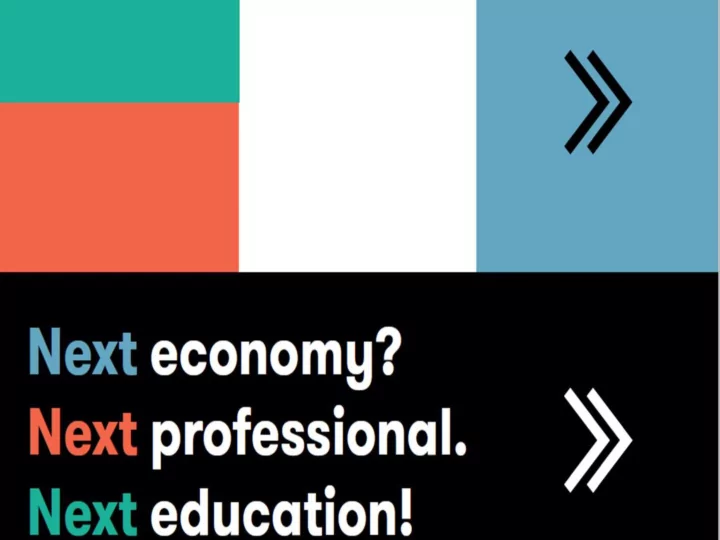

Metropolitan region Rotterdam The Hague (MRDH) 2.2 million people 23 municipalities 1 million houses 12 million m2 office space 3.800 ha business area 12 knowledge & research institutes 50 business networks
Urgency • Economic potential of MRDH is insufficiently utilized • Necessity to intensify regional collaboration (OECD report February 2016, commissioned by MRDH and Ministry of the Interior) • Need for a comprehensive, resilient & sustainable economic strategy : ‘one region, one vision, one investment strategy’ MRDH
Next economy => Questions for our region: • What will be our future earning capacity? • What future labour market will evolve? • What (future) skills are required? • What will be the effects on the urban environment and civilisation? How do we deal with: - digitalisation:robots,sensors,3 d printing -circularity -sharing economy?
Road map Next Economy: Five Transition Pathways • Digital Gateway to Europe towards zero marginal cost • Smart Energy Delta towards zero carbon • Circular Economy towards zero waste • Entrepreneurial Region towards a productive region • The Next Society towards an inclusive economy
Next xt Economy & Labour Market New way of working: - Innovation is the key for all workers - Business organisations and labourmarket are changing * life span of products has declined * work organised by digital platforms * flexible hierarchy * distinction work-private life erodes - Diversity in employment relationships Will robots take our jobs ? Opinions of researchers vary considerably. - jobs will disappear, - content of jobs will change (50%), - new jobs will come up,
Next xt Economy Labour Market II II It will affect all kind of jobs - High qualified : preparing, planning and operations might be automatized/digitalized. - Middle : automation/digitization will lead to loss of jobs e.g. banks and insurance companies - Low skilled : a large part of the work can not be automatized: care, relief work, hotel and catering industry etc. Lessons: -learning & working difficult to separate -Hybrid jobs; different, part-time (Gig economy) -Permanent contract for life, disappear
How do we prepare? -Next (s (soft ft) skil ills • personal skills ict skills, learn how to learn, creative thinking, how to collaborate • Creative- and entrepreneurial skills design-thinking; problem solving, co- creation: multi-disciplinary, teamwork; entrepreneurship • Professional knowledge and -skills will build the layers for a flexible and innovative mind set: why not mentality. Why is this important ? Volberda, 2015: If you invest in ( disruptive) innovation, technological innovation contributes 40% and social innovation 60%.
How can organisations & education become more flexible and adaptive ?
RNE Education Platform Solution Solution Solution Lab Lab Lab MRDH H Progra Pro ram m 2 new for 21st for t initi tiati tives century tury on on Skills Sk neighbour- hood hood learning rning Academi mic 5 new MR 5 new worksp rkspaces Regional So Social Fieldlabs – tea teacher r Life Long Innovati tion in the the developme ment Learning rning -prog rograms rams Region Prog Program ram s
Next Skills: developing high quality and relevant skils for students and teachers: i.g.problem solving, design thinking, creativity, intra- & interpersonal skills N ext methods : Talent development & Qualification go hand in hand: Hybride constructies; contextual-, social- and productive learning ; Makerspaces & labs : Blended learning en MOOCS; Entrepreneural ecosystems : pre-start-up Education (hackathons, pressure cookers, battles) and innovatielabs Next teacher & Teaching : Sufficient numbers and well qualified : change of role Life long learning : Permanent education & re-integration; public, private cooperation in education & labor- market questions. Basic & digital skills for every-one. Contribution to a inclusive society: - social entrepreneurship - community learning ; “the City as a Campus ”: makerspaces within the communities - education as innovatiepartner : vocational training for social innovation and starting entrepreneurs. Public Private Co-creation & Partnership - Citylabs;Techlabs & Fablabs: Research, design and manufacturing( Proof of concepts, prototyping, one-offs) – Centres of Expertise & Centres for innovation and craftmanship – Incubators & Accelerators ; Stimulating entrepreneurship: YES Delft, Metropolitan Startup Lab – Campuses & Field labs – new product-& service development – Communities of Practice – new business concepts & business models .
Mission: bridge the gap! Technological Innovation RNE Next Education Group Social innovation INNOVATION System Innovation TIME
Discussion & Questions
Recommend
More recommend